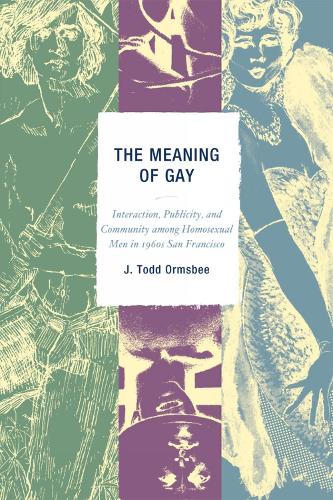
The Meaning of Gay: Interaction, Publicity, and Community among Homosexual Men in 1960s San Francisco
(Paperback)
Publishing Details
The Meaning of Gay: Interaction, Publicity, and Community among Homosexual Men in 1960s San Francisco
By (Author) Todd J. Ormsbee
Bloomsbury Publishing PLC
Lexington Books
8th March 2010
United States
Classifications
Professional and Scholarly
Non Fiction
306.766209046
Physical Properties
Paperback
354
Width 155mm, Height 237mm, Spine 25mm
535g
Description
Homosexual men in San Francisco had started the 1960s interacting mostly in private, informal groups, meeting in bars and house parties. But by 1972, the city had a 'gay community' and 'gay pride,' all celebrated with a parade. Through numerous organizations and publications, gay men created a counter-publicity to fight against their domination and subordination, and had begun to try to build a community that would foster deeper, more meaningful relationships with each other. The emergent counter-publicity and community in turn created the social spaces necessary for gay men to create an expanding range of possible meanings for their 'gayness,' meanings that aligned more closely with their experiences and which better helped them meet their needs and desires. The gayness they created could expand and contract depending on the needs and circumstances of the individual or group. Rather than the typical story of the evolution from 'conservative' to 'radical' social movement, The Meaning of Gay sees the development of gay politics as the shift from the need to establish a public-facing gayness in the early 1960s, to the community building efforts that began in the mid-1960s, through the efforts to create a gayness based in authenticity, brotherhood, and revolution in the early 1970s. Each of these developments flowed from gay men's responses to the swiftly changing San Francisco and American environment. The dramatic explosion of possibilities for gayness that emerged during the 1960s may serve as a touchstone for those concerned with the problems of gay male life in the twenty-first century. This book traces these developments as they was recorded in the gay periodicals of the era, and analyzes them from the perspective of John Dewey's theory of mind, desire, public, valuation, and democratic community.
Reviews
Freshly theorized through John-Dewey pragmatism and historically grounded in rigorous archival research, J. Todd Ormsbee delivers a compelling story about gay-and-lesbian politics in 1960s and early-1970s San Francisco. The Meaning of Gay amply demonstrates the complex politicssometimes uncertain and often contentiousthat a specific community engaged in order to claim justice for their queer identities; indeed, the stakes were high and directly affected their lives. Undoubtedly, the political stakes The Meaning of Gay recounts still resonate to this day. -- David A. Gerstner, City University of New York
Ormsbee leads us on a skillfully documented journey through 1960s San Francisco, as gay men individually and collectively struggled to transform how they and others viewed their sexual identities and practices. He offers a detailed mapping of the contested landscape of private and public gay sexuality culminating in the first gay pride march in 1972a moment of celebration and spectacle that paved a path into the present. Anyone interested in U.S. cultural history should read this book. -- Joane Nagel, University of Kansas
Ormsbee provides a rich ethnographic account of gay cultural history in that embryonic period before Stonewall. His claims about the complexity of the gay male community experience are important not only for how we understand culture as a developmental and ongoing process of contested meaning-making, but also as a bracing tonic to those in the social sciences who clamor for parsimony at the expense of recognizing the complicated nuances comprising human realities.... -- Stephen M. Engel, author of The Unfinished Revolution: Social Movement Theory and the Gay and Lesbian Movement
Ormsbee provides a rich ethnographic account of gay cultural history in that embryonic period before Stonewall. His claims about the complexity of the gay male community experience are important not only for how we understand culture as a developmental and ongoing process of contested meaning-making, but also as a bracing tonic to those in the social sciences who clamor for parsimony at the expense of recognizing the complicated nuances comprising human realities. -- Stephen M. Engel, author of The Unfinished Revolution: Social Movement Theory and the Gay and Lesbian Movement
Author Bio
J. Todd Ormsbee is assistant professor of American Studies at San Jose State University.
